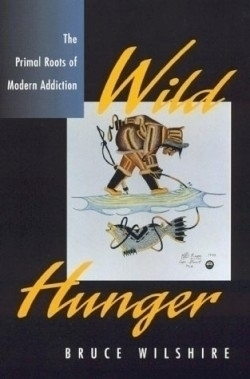
Wild Hunger
The Primal Roots of Modern Addiction
Current debates surrounding the genesis of addiction have focused on physical and/or mental causes, but Wilshire looks at the topic from an entirely different perspective. Using a mix of spirituality, psychology, evolution and ecological awareness, he fashions a persuasive argument for why our society, like so many before it, has turned to artificial stimulants, depressants, and pleasures.
Adopting a position similar to Thoreau toward awareness of nature, Wilshire posits that humans are drawn to addictive substances because we’ve lost touch with the natural world, ignoring our embedded genetic memories and skimming across the surface of our surroundings.
Our hunter-gatherer physiology is poorly prepared for the onslaught of technology, and, as a result, we drift further away from knowledge of our natural selves. According to Wilshire, each of us has a “wild hunger” that is unsatisfied by the neatly packaged food that we consume and by the isolation that cars and air-conditioned buildings bring. We are suffering from ecstasy deprivation, something, which was once satiated by contact with the natural world and can only now, unless we tune into the world, be replaced by addiction to drugs, alcohol, sex, and even technology.
At its best, Wild Hunger sparks contemplation not only on the issue of addiction, but also on the topic of how far we’ve strayed in thought and deed from our ancestors. The book falters only when the author attempts to underscore his points by including long passages about a walk he took with his dog once—a device which proves to be precious and unnecessary. Even if one doesn’t agree with all of Wilshire’s conclusions, his passion, reason and earnest hope for the future of humankind make this a compelling read.
Reviewed by
Elizabeth Millard
Disclosure: This article is not an endorsement, but a review. The publisher of this book provided free copies of the book to have their book reviewed by a professional reviewer. No fee was paid by the publisher for this review. Foreword Reviews only recommends books that we love. Foreword Magazine, Inc. is disclosing this in accordance with the Federal Trade Commission’s 16 CFR, Part 255.
